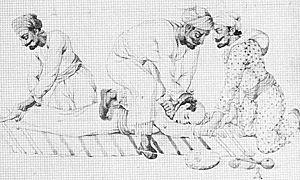 adhoreea: a person who happens to separate himself from a party before the Phransigars murder them, thereby escaping death unknowing.
adhoreea: a person who happens to separate himself from a party before the Phransigars murder them, thereby escaping death unknowing.
bae hojana: to become public. May be used of the bodies of victims or of some news of the Phransigars' actions.
bajeed: safe. The leader is informing the troop that this is a good place for the killing.
bisul purna: awkward strangling, with the rumal around the head or face. The victim is then said to have been bisull.
boja: the Phransigar who takes the body of the murdered person to the grave.
bugjana: to become aware of the designs of the Phransigars upon oneself.
bunij: (literally merchandise or goods) a traveller whom the Phransigars think worth murdering.
chookadena: to cause a victim to sit down, and then to trick him into looking up; this puts him into a perfect position for strangling. Sacrifices made in this manner are the most pleasing to the Dark Mother.
dhaga: finding out the intentions of travelers; negotiating with someone in authority for protection, or for the release of a Phransigar who has been arrested.
dhokur: a dog, also a person who takes hold of a Phransigar, attempting to halt a killing.
dhurdalna: to strangle.
doonr: the loud screams of a victim for help.
ghookhee: a person who is transporting the body of a relative for burial. (Not a professional undertaker.) This person is doing a deed greatly pleasing to Kali. He or she is not to be killed.
goneeait: a person who has lost a hand or a nose. It is very unlucky to kill such a person.
goor ghaunt: the special knot for tying Kali's coin into the rumal.
jhummanta: a person who is not a Phransigar, but who knows what they are. A person to be avoided. In some troops, such a person is felt -to be under Kali's protection.
jywaloo: a victim left for dead who is later found still living. khomusna: to rush in upon and kill travelers when there is not time for the usual ceremonies khurnk- tha nnica mania by tha nirkava whan digging the grave.
kucha: (literally, unburied) a dead body, or a Phransigar who has talked to the authorities.
Luckman Sing: a person's name used as a signal that someone is coming; do not murder just now.
mauiee: the man who takes money home from Phransigars on an expedition for the maintenance of their families.
phur jharna: To clean the place of murder. After a killing, some members are left behind to remove all signs that may be seen by daylight.
pola: the sign made at a crossroad to guide troop members who are travelling behind. A line made on the road surface in the direction taken. If the other members must hurry, this will be a broken line, or a line with just one break if it must be that evening. The line may be of paint or oil from an "accidental" spill, or of leaves or branches, coolant, scrap, or whatever else they find which is useable.
saur: a person who escapes from the Phransigar while they are in the process of strangling him. soon: a Phransigar by birth or adoption who has not yet done his first ceremonial killing.
sotha : the Phransigar who convinces travellers; always the most persuasive in the troop.
tonkal: a party of people too large for the Phransigar to kill
Phransigars The Strangler Cult
- The Strangler Cult
Tragedy: Phransigar Style
Ramasee: The Secret Language
Origin of the Phransigar
Tuponee: The Ritual of Sacrifice
Back to BattleTechnology 7 Table of Contents
Back to BattleTechnology List of Issues
Back to MagWeb Magazine List
© Copyright 1988 by Pacific Rim Publishing.
This article appears in MagWeb (Magazine Web) on the Internet World Wide Web.
Other military history articles and gaming articles are available at http://www.magweb.com